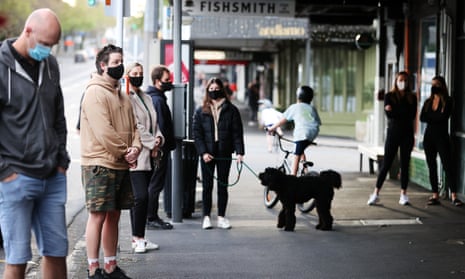New Zealand is bracing for increasing numbers of Covid-19 cases after recording 94 new infections over the weekend, while pandemic modellers say that if the government stays its current course new cases will quickly top 100 a day.
“We are on the exponential growth curve,” an epidemiologist and public health professor, Michael Baker, said. “If you look at the trend, it’s clearly going up in Auckland, and it’s not just the total cases but also the unexplained cases, which suggests transmission in the community is increasing.”
On Monday afternoon, prime minister Jacinda Ardern announced the government would be delaying the reopening of schools, and Auckland would maintain its current level of restrictions for another week as they waited for vaccination levels to rise.
“This is a tricky period in our Covid response. I understand why people will ask for and want more certainty than we can provide right now,” Ardern said. “That’s because we are in new territory, but our goal remains the same, even if the approach to achieving it changes.”
“We have a pathway forward,” she said. “We remain in a very strong position to make the transition from lockdown restrictions to the individual armour of vaccines while maintaining our world leading position on case numbers, hospitalisations and deaths.”
Ardern also announced that the government was creating vaccine mandates for teachers and frontline health workers. All those working in schools who have contact with children will have to be vaccinated, as well as all those in high-risk health and disability health workforces.
Covid 19 response minister Chris Hipkins said “while most people working in these sectors are already fully or partially vaccinated, we can’t leave anything to chance and are making it mandatory.”
“It’s not an easy decision, but we need the people who work with vulnerable communities who haven’t yet been vaccinated to take this extra step,” he said.
But Baker said that if the government kept its current restrictions, or loosened them further by reopening schools, as flagged last week, “there’s only one way it can go and that’s up”.
“This is really simple. This is where every epidemiologist and disease modeller will agree 100%. Don’t do it.”
Case numbers began rising steadily soon after the government loosened restrictions in Auckland, the centre of the Delta outbreak, from a level 4 to level 3 lockdown. Cases have since spread beyond the city’s borders, cropping up in Northland and Waikato.
On Monday, the government announced another 35 cases, all in Auckland, taking the total number of cases in the outbreak to 1,622. According to the Ministry of Health, 29 of the previous day’s cases were infectious in the community, and 21 of the cases announced had not yet been linked to existing cases.
Last week, the government announced a new “steps” system for Auckland to reduce restrictions in the coming weeks, subject to case numbers: first allowing outdoor gatherings, then gradually reopening some schools and allowing retail and hospitality to restart.
Baker said that with Auckland’s outbreak growing, following those steps would be a mistake and could cause the outbreak to explode.
“You go down the alert level system when the outbreak is coming under control,” he said. “You don’t go down the system when the outbreak is increasing. This is basic infectious disease epidemiology.”
Pandemic modellers for research centre Te Punaha Matatini said New Zealand’s outbreak currently had an R value (or reproduction value) of about 1.2 or 1.3. If it reached 1.5, case numbers would double every eight days.
Michael Plank from Te Pūnaha Matatini and University of Canterbury told Stuff that New Zealand was “on the knife-edge”.
“Any further loosening of restrictions until we have got a picture of what the consequence of the most recent easing was could potentially cause things to spiral very rapidly.”
In recent days, cases have begun spreading to healthcare workers: three workers at Auckland City Hospital and two at North Shore Hospital have tested positive. Three people at Mt Eden prison have also tested positive.
So far 55% of the eligible New Zealand population (those aged 12 and over) are fully vaccinated, and 79% have had at least one dose.
On Monday morning, the government said it had signed a deal for 60,000 doses of a new antiviral, molnupiravir, that significantly reduces risk of severe Covid illness.
Merck, the manufacturer, said that in a trial the drug treatment cut hospitalisations and deaths by half.
Ardern said: “Antiviral medicines are an additional tool the government is adding to our toolbox to fight Covid-19.
“The most important thing people can do to prevent themselves, children and vulnerable people getting Covid is to get vaccinated. However, it’s important we have medicines to help those who pick up the virus to avoid having to go to hospital.”
